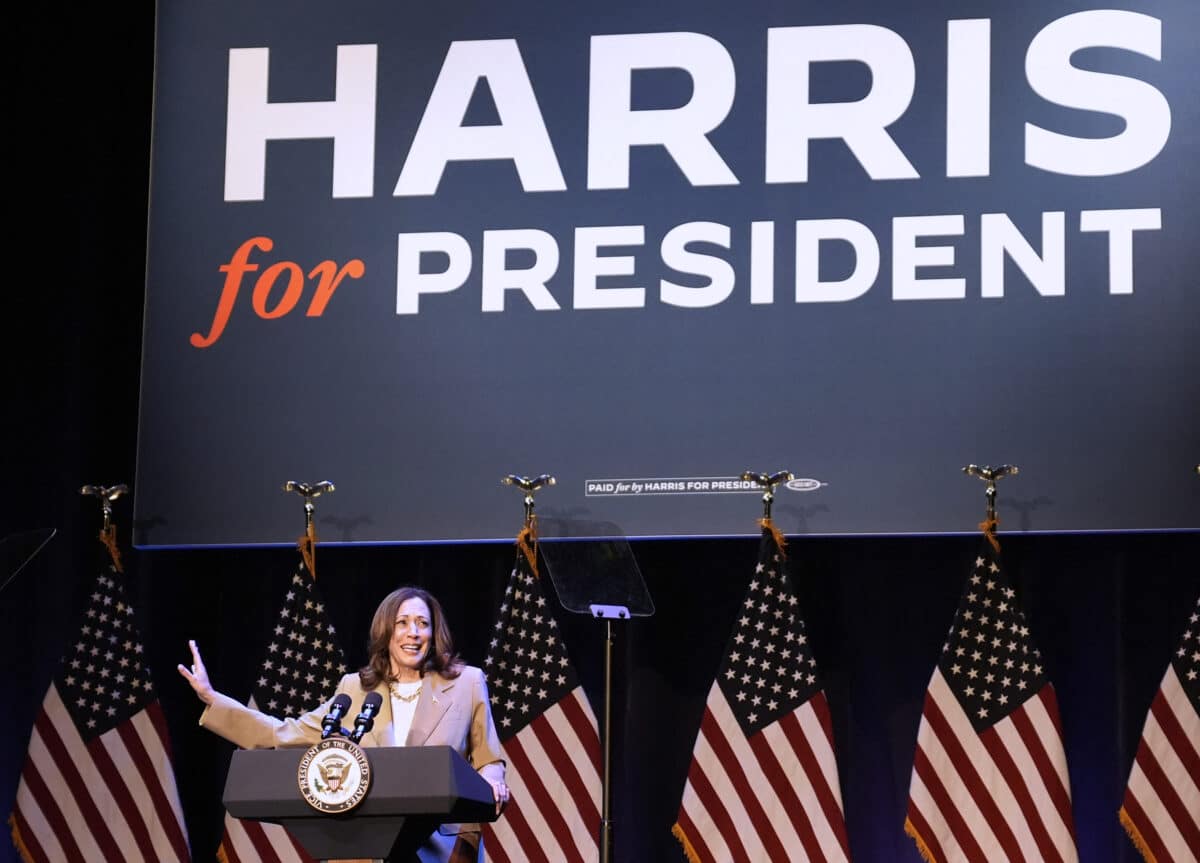
US Vice President and Democratic presidential candidate Kamala Harris speaks during a campaign fundraising event at the Colonial Theater in Pittsfield, Massachusetts, on July 27, 2024. (AFP)
WASHINGTON – Newly thrust into the race for the White House, Vice President Kamala Harris embarks Monday on a pivotal week for her campaign as she intensifies the search for a running mate.
The US vice president, who is all but certain to secure her party’s official nomination to challenge Donald Trump this November, is set to announce the number two on her ticket in the coming days.
‘Compressed timetable’
Choosing a vice president is a critical step for any presidential hopeful, a chance to broaden their appeal to the electorate with a complementary partner.
It is a process that normally spans several months, involving meticulous vetting of contenders’ experience, their finances, hobbies — and any lurking scandals.
But with Biden’s late exit from the race, Harris faces a “compressed timetable” of mere weeks, says Joel Goldstein, a scholar of vice presidencies at Saint Louis University.
Harris is reportedly expected to reveal her choice by August 7 — less than 20 days after launching her campaign.
Speculation is rife about who will be selected, with political observers suggesting a likely choice will be a white man with executive experience “beyond the Beltway” — meaning outside Washington.
If she wins in November, Harris would make history as the first woman, the first person of South Asian descent, and the second Black person to serve as US president.
“One of the features of vice presidential selection often involves balance,” Goldstein told AFP.
It is no surprise then that commentators expect Harris’s pick to come from a more Republican-leaning area than her home state of California, a Democratic stronghold.
Of the five names currently dominating discussion, four are Democratic governors: Josh Shapiro of Pennsylvania, Roy Cooper of North Carolina, Andy Beshear of Kentucky and Tim Walz of Minnesota.
The fifth is US Senator Mark Kelly of Arizona, a former astronaut.
Cooper, Shapiro and Kelly all hail from swing states, critical battlegrounds on which the election hinges — while Beshear is in his second term in reliably Republican Kentucky.
Walz’s Minnesota has similar demographics to pivotal Midwest neighbors Michigan and Wisconsin.
J.D. Vance in trouble
Harris’s selection process is being scrutinized all the more closely given the troubles embroiling US Senator J.D Vance, Trump’s handpicked running mate.
The Ohio Republican, a graduate of Yale Law School who styles himself as a blue-collar hero, was chosen for his relative youth and fervent defenses of Trump, despite previously opposing the billionaire.
But the “Hillbilly Elegy” author’s popularity has taken a hit in recent weeks after damaging old videos resurfaced.
In one clip, he disparaged prominent Democratic women as “childless cat ladies,” provoking fury among women voters, including several celebrities.
Meanwhile, his past comments about being a “never Trump guy” who “never liked him” have been remixed into a trending song on TikTok.
‘The most insignificant office’
For Goldstein, the turmoil engulfing Vance highlights a failure on the fundamentals of the vice presidential vetting process.
“I think the first questions have to be: can they get through the vetting screen? Are they a plausible president who’s ready for the national stage?” he said.
In fact, the primary role of a vice president is to replace the president in the event of their death or resignation.
To date, nine vice presidents have ascended to the presidency under such circumstances — most recently Gerald Ford, who took over after Richard Nixon resigned amid the Watergate scandal.
Apart from breaking tie votes in the US Senate, the role, as defined by the Constitution, remains quite limited.
The first US vice president, John Adams, complained bitterly about his fate in a 1793 letter to his wife: “My country has in its wisdom contrived for me the most insignificant office that ever the invention of man contrived or his imagination conceived.”